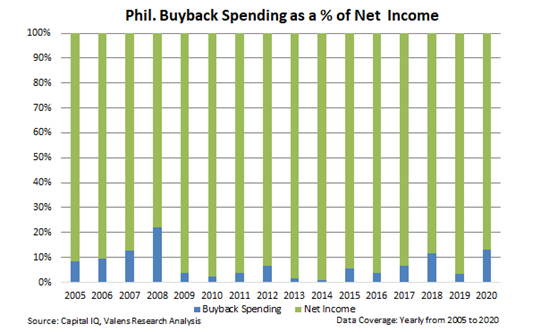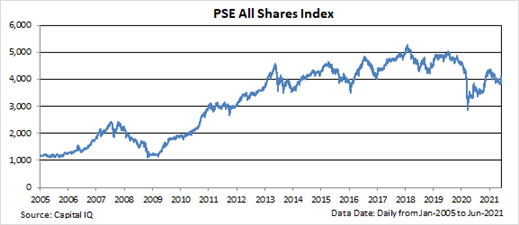MONDAY MACRO: This chart shows how simple transactions can impact the entire Philippine stock market

When discussing the stock market or the Philippine economy, we often look at the current investor sentiment or the latest macro indicators. However, a key area often underlooked is what management thinks about the current and future environment.
This chart shows one way of measuring management sentiment, by looking at one of the few ways companies can influence equity prices: share buybacks.
Philippine Markets Daily:
The Monday Macro Report
Powered by Valens Research
In 2020, Philippine share buybacks as a % of net income reached its highest level since 2008. To the average investor, this decision to allocate large amounts of cash to buy back shares during a pandemic might not sound like a good use of capital.
However, as we’ve recently discussed, even amidst the pandemic, Philippine corporations’ aggregate credit profile is still relatively safe. So share buybacks in 2020 and 2021 are unlikely to be a cause of liquidity problems.
In addition, share buybacks make more sense once we look at what drives management teams to buy back a certain number of outstanding shares from shareholders.
Theoretically, share buybacks are similar to dividends in the sense that companies are simply returning cash to its shareholders.
Just like dividends, share buybacks are either beneficial or detrimental to the company, depending on the timing and context.
There are many reasons why a management team would engage in share buybacks.
One, by buying out other shareholders, the company lowers its average cost of capital. Since cost of equity is generally higher than cost of debt (cost of debt is tax-deductible), reducing equity in the market helps lower the percentage of total capital of equity.
If the company were a dividend-paying company, fewer outstanding shares would also mean fewer dividends to pay.
Two, fewer shares in the market also makes the company’s financial performance seem better. The lower shareholders’ equity amount can make a company’s EPS and ROE grow nominally without any earnings improvement.
Three, and the most common reason for share buybacks, management believes the company’s stock price is undervalued. While the market is often correct at fairly valuing publicly traded companies, management can sometimes significantly disagree with the current market sentiment.
Since management has access to both private and public information related to the company, they are likely to have a better understanding of the company’s fundamental value, making it wise to also monitor their actions.
In addition, investors can at times be too emotional and can overstate the impact of recent news, driving a company’s stock to levels lower than it fundamentally should be.
We can see how different investor sentiment can be from management sentiment at times of market panic when we look at the history of share buybacks.

The chart above shows how much Philippine corporations have spent annually on share buybacks as a % of net income since 2005. It’s no coincidence that when the Philippine stock market entered into a bear market during the years 2007-2008, 2018, and 2020, buyback spending rose to levels above 10%.
2007-2008 was the year of the Global Financial Crisis. While the Philippines did not experience a recession at the time, the PSE All Shares Index fell by more than half from 2,409.42 in October 2007 to 1,138.07 in October 2008.
Meanwhile, in 2018, inflation concerns and the US-China trade war sent the index toppling by 20% from its historical peak of 5,273.00 in January 2018 to 4,211.13 in November 2018.
Now more recently in 2020, the implementation of the COVID-19 quarantine has caused the index to fall by 40% from 4,655.54 in January 2020 to 2,881.58 in March 2020.
All three of the mentioned events warranted a decline in equity prices, but it’s clear that the market had overreacted. Not too long after these events, the index made a partial recovery.

Management teams were right to do large amounts of buybacks during the past bear markets. Stock prices overall were indeed below their fundamental value, even when pricing in the headwinds.
Any massive share buybacks in the future should warrant close examination to see whether it’s one of the few times that the market is in the wrong.
However, one must be also wary that share buybacks can be incorrectly used by management. The short-term boost in the stock price after a buyback can be deceivingly good for investors. Some may be led to think that the company’s fundamentals have improved when it actually did not change.
Furthermore, every peso spent on share buybacks is every peso not invested towards the company’s growth. It could be the case that management is misallocating capital or is struggling to search for investment opportunities.
Even in a recession, share buybacks may not necessarily be the best action when competitors continue to invest. That said, this only seems like a company-specific problem and not a market-wide issue.
About the Philippine Market Daily
“The Monday Macro Report”
When just about anyone can post just about anything online, it gets increasingly difficult for an individual investor to sift through the plethora of information available.
Investors need a tool that will help them cut through any biased or misleading information and dive straight into reliable and useful data.
Every Monday, we publish an interesting chart on the Philippine economy and stock market. We highlight data that investors would normally look at, but through the lens of Uniform Accounting, a powerful tool that gets investors closer to understanding the economic reality of firms.
Understanding what kind of market we are in, what leading indicators we should be looking at, and what market expectations are, will make investing a less monumental task than finding a needle in a haystack.
Hope you’ve found this week’s macro chart interesting and insightful.
Stay tuned for next week’s Monday Macro report!
Regards,
Angelica Lim
Research Director
Philippine Markets Daily
Powered by Valens Research
www.valens-research.com




